Ustad Nusrat Fateh Ali Khan PP (Punjabi: نصرت فتح علی خان, Punjabi pronunciation: nʊsˈɾət̪ ˈfət̪e(ɦ) əliː ˈxɑːn; born Pervez Fateh Ali Khan; 13 October 1948 – 16 August 1997), also known by his initials NFAK, was a Pakistani singer, songwriter, and music director. Ustad was primarily a singer of qawwali, a form of Sufi devotional music. Often referred to as the “Shahenshah-e-Qawwali” (the King of Kings of Qawwali), he earned recognition from The New York Times as the greatest qawwali singer of all time and ranked fourth among the greatest singers by LA Weekly in 2016. Known for his powerful vocals, he could perform with high intensity for several hours. Khan also played a key role in bringing Qawwali music to international audiences. He was also a master of Hindustani classical music.
Born in Lyallpur (Faisalabad), Dominion of Pakistan, Khan had his first public performance at the age of 15 at his father’s chelum. He became the head of the family qawwali party in 1971 and brought his unique style of sargam, khayal, and rhythm to his family’s legacy. He was signed by Oriental Star Agencies, Birmingham, England, in the early 1980s. Khan went on to release movie scores and albums in Europe, India, Japan, Pakistan, and the U.S. He engaged in collaborations and experiments with Western artists, becoming a well-known world music artist. He toured extensively, performing in over 40 countries. In addition to popularising qawwali music, he also had a profound impact on contemporary South Asian popular music, including Pakistani pop, Indian pop, and Bollywood music.
Early life
Khan was born into a Punjabi Muslim family in Lyallpur (modern-day Faisalabad), Punjab, Pakistan, in 1948. Khan’s family had emigrated to Basti Sheikh Darvesh in Jalandhar at the end of the 12th century. His ancestors learned music and singing there and adopted it as a profession. He was the fifth child and first son of Fateh Ali Khan, a musicologist, vocalist, instrumentalist, and qawwal. Khan’s family, which included four older sisters and a younger brother, Farrukh Fateh Ali Khan, grew up in central Faisalabad.
Read More: Ryan Reynolds | Margaret Qualley
The tradition of qawwali in the family has been passed down through successive generations for almost 600 years. Initially, his father did not want Khan to follow the family’s vocation. He had his heart set on Nusrat choosing a much more respectable career path and becoming a doctor or engineer because he felt qawwali artists had low social status. However, Khan showed such an aptitude for and interest in qawwali, that his father finally relented.
Nusrat Fateh Ali Khan Age Death Wife Children Family Biography
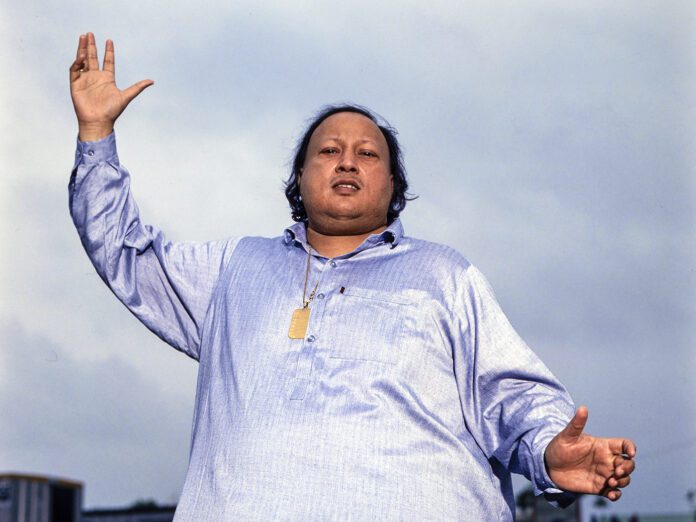
| Bio | |
|---|---|
| Real Name | Nusrat Fateh Ali Khan Pervaiz Ali Khan (Born) |
| Profession | Singer & Music composer |
| Physical Stats & More | |
| Height (approx.) | in centimeters– 170 cm in meters– 1.70 m in feet inches– 5’ 7” |
| Weight (approx.) | in kilograms– 136 kg in pounds– 299 lbs |
| Eye Colour | Black |
| Hair Colour | Black (semi-bald) |
| Personal Life | |
| Date of Birth | 13 October 1948 |
| Birth Place | Faisalabad, Punjab, Pakistan |
| Date of Death | 16 August 1997 |
| Place of Death | London, England, UK |
| Age (at the time of death) | 48 Years |
| Death Cause | Cardiac Arrest |
| Resting Place | Kabootran Wala Qabristan (aka Jhang Road Graveyard, Jhang Road, Faisalabad) |
| Zodiac sign/Sun sign | Libra |
| Nationality | Pakistani |
| Hometown | Faisalabad, Punjab, Pakistan |
| School | Not Known |
| College | Not Known |
| Educational Qualification | Not Known |
| Debut | Playback Singer: film- Nakhuda, Song- Haq Haq Ali |
| Family | Father– Fateh Ali Khan Mother– Name Not Known Brother– Farrukh Fateh Ali Khan 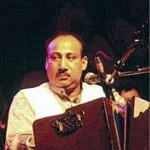 Sisters– 4 (Name Not Known) Nephew– Rahat Fateh Ali Khan 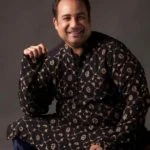 |
| Religion | Islam |
| Hobbies | Writing & Travelling |
| Favourite Things | |
| Favourite Food(s) | Seekh Kabab, Biriyani, Butter Chicken |
| Favourite Musician(s) | Fateh Ali Khan, Alam Lohar, Noor Jehan |
| Girls, Affairs and More | |
| Marital Status | Married |
| Wife/Spouse | Naheed Nusrat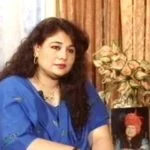 |
| Marriage Date | Year 1979 |
| Children | Son– None Daughter– Nida Fateh Ali Khan 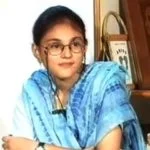 |
| Money Factor |
|
| Salary | 4-5 Lacs/song (INR) |
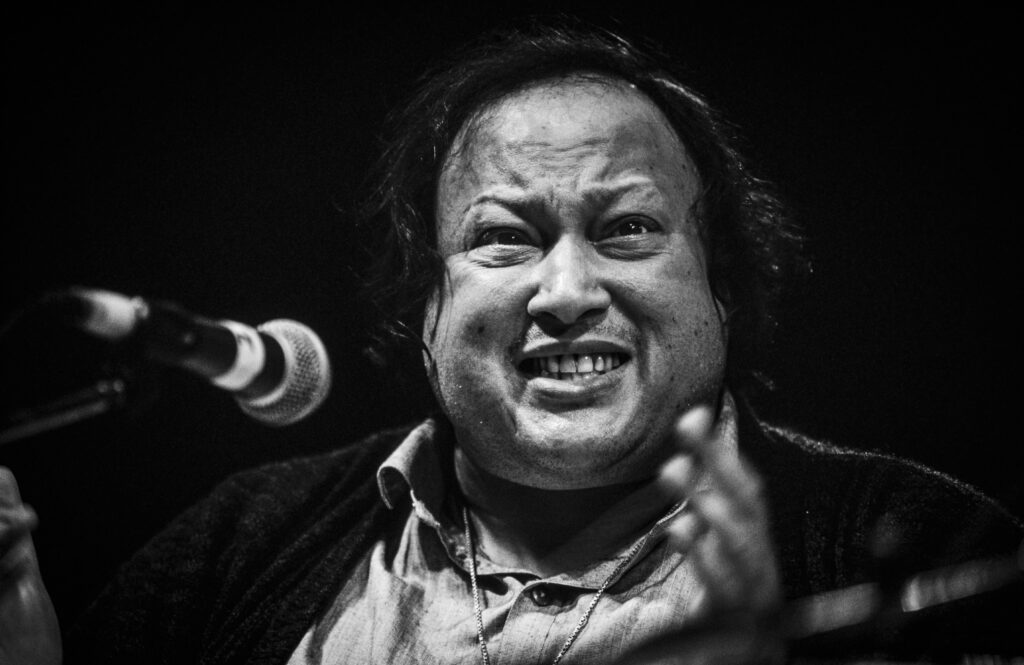
Career
In 1971, after the death of his uncle Mubarak Ali Khan, Khan became the official leader of the family qawwali party, and the party became known as Nusrat Fateh Ali Khan, Mujahid Mubarak Ali Khan & Party. Khan’s first public performance as the leader of the qawwali party was at a studio recording broadcast as part of an annual music festival organized by Radio Pakistan, known as Jashn-e-Baharan. Khan sang mainly in Urdu and Punjabi and occasionally in Persian, Braj Bhasha, and Hindi. His first major hit in Pakistan was the song Haq Ali Ali, which was performed in a traditional style with traditional instrumentation. The song featured restrained use of Khan’s sargam improvisations.
1980s
In the summer of 1985, Khan performed at the World of Music, Arts and Dance (WOMAD) festival in London. He performed in Paris in 1985 and 1988. In 1987, he visited Japan for the first time at the invitation of the Japan Foundation. During his trip, he participated in the 5th Asian Traditional Performing Art Festival. The following year, he took the stage at the Brooklyn Academy of Music in New York, earning admiration from the American audience.
In 1988, Khan teamed up with Peter Gabriel on the soundtrack to The Last Temptation of Christ, which led to Khan being signed to Gabriel’s Real World label.
In 1989, commissioned by Oriental Star Agencies Ltd in Birmingham, UK, Khan collaborated at Zella Recording Studios with composer Andrew Kristy and producer Johnny Haynes on a series of ‘fusion’ tracks that propelled Nusrat Fateh Ali Khan and Party into the Channel 4 Christmas Special of “Big World Café.” While in the UK in 1989, Khan and his party performed Sikh devotional music at a Sikh Gurdwara in Slough, continuing a tradition of Muslims performing hymns at Sikh temples.
1990s
Following this, in 1990, the BBC devoted a programme of its series Network East to this collaboration, and Big World Café invited Khan, Andrew Kristy, and violinist Nigel Kennedy to perform Allah Hoo live on the show. A UK tour performing these new fusion tracks happened in 1990.
In the 1992 -1993 academic year, Khan was a visiting artist in the Ethnomusicology department at the University of Washington, Seattle, Washington, United States.
Khan released five albums of traditional qawwali through Real World, along with the more experimental albums Mustt Mustt (1990), Night Song (1996), and the posthumous remix album Star Rise (1997). Khan’s experimental work for Real World, which featured his collaborations with the Canadian guitarist Michael Brook, led to several further collaborations with other Western composers and rock musicians. One of these collaborations occurred in 1995, when Khan teamed up with Pearl Jam’s lead singer Eddie Vedder on two songs for the soundtrack to Dead Man Walking. Khan contributed vocals to The Prayer Cycle, a project by Jonathan Elias, but passed away before completing the tracks. To finish the recordings, Alanis Morissette joined in to sing alongside his unfinished vocals. In 2002, Gabriel included Khan’s vocals on the track “Signal to Noise” on his album Up.
Khan was the main performer at Imran Khan’s charity appeal concert at the InterContinental London Park Lane Hotel on December 3, 1992 to raise funds for Shaukat Khanum Memorial Cancer Hospital and Research Centre, a cancer hospital built in Imran’s mother’s name which provides free services. The audience included Peter Gabriel, Elizabeth Hurley, Mick Jagger, and Amitabh Bachchan.
Khan received a Grammy Award nomination for Best Traditional Folk Album in 1997 for his album Intoxicated Spirit. That same year, his album Night Song also earned a nomination for Best World Music Album.
Khan contributed the song “Gurus of Peace” to the 1997 album Vande Mataram, composed by A. R. Rahman, and released to celebrate the 50th anniversary of India’s independence. As a posthumous tribute, Rahman later released an album titled Gurus of Peace which included “Allah Hoo” by Khan. Rahman’s 2007 song “Tere Bina” for the film Guru was also composed as a tribute to Khan.
Khan contributed songs to several Pakistani films and composed music for three Bollywood films before his death. In Aur Pyaar Ho Gaya, he sang Koi Jaane Koi Na Jaane and Zindagi Jhoom Kar on-screen. He also composed music for Kartoos, singing Ishq Da Rutba and Bahaa Na Aansoo alongside Udit Narayan. His final Bollywood composition was for Kachche Dhaage, where he sang Iss Shaan-E-Karam Ka Kya Kehna.
Although he passed away in 1997, his music continued to be released. Kachche Dhaage premiered in 1999, along with his song Saya Bhi Saath Jab Chhod Jaye from Dillagi. In 2000, his song Dulhe Ka Sehra from Dhadkan was also released. Legendary singers Asha Bhosle and Lata Mangeshkar performed his compositions in Bollywood.
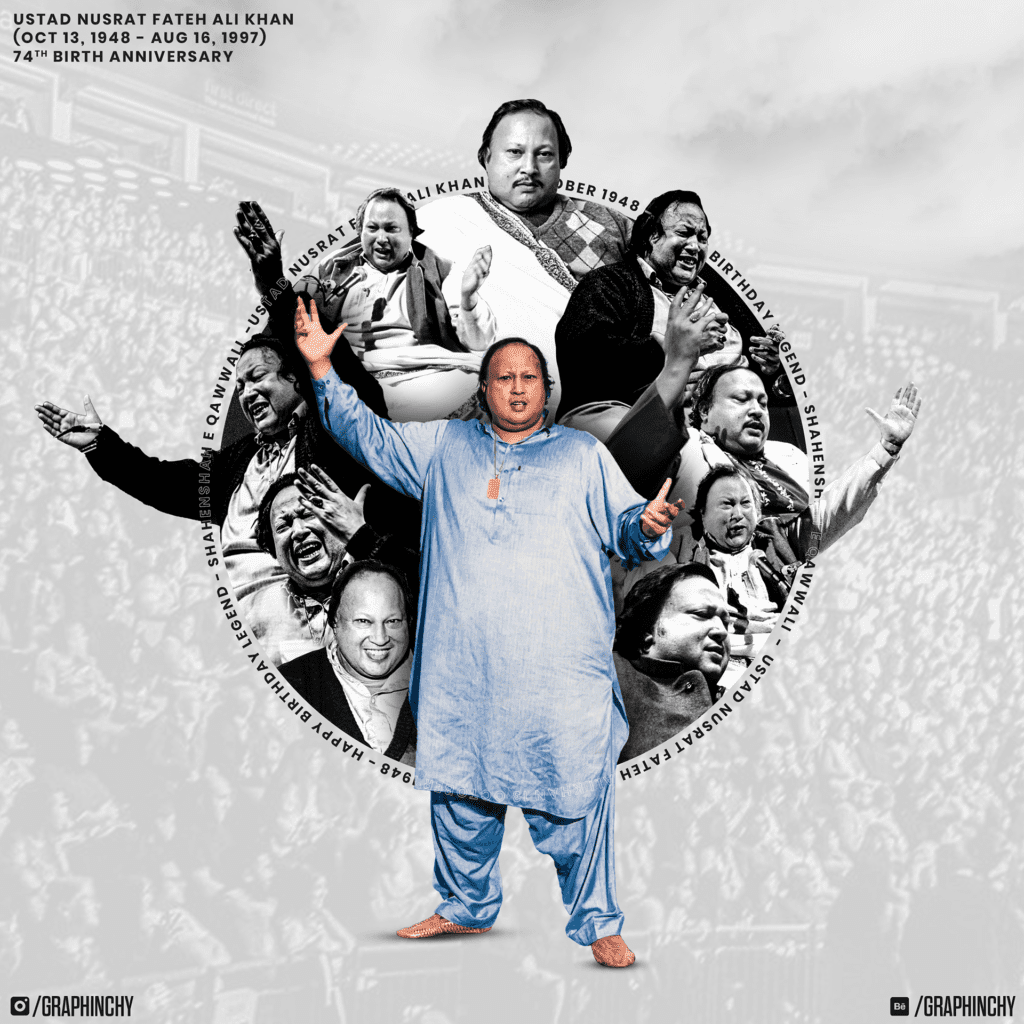
Death
Khan had been seriously ill for several months, according to a spokesperson at his U.S. label, American Recordings. After traveling to London for treatment for liver and kidney problems, Khan arrived at the airport in critical condition and was taken to the Cromwell Hospital. There, he suffered a sudden cardiac arrest and passed away on 16 August 1997 at the age of 48. His family transported his body back to Faisalabad, where thousands attended his funeral. His wife, Naheed Nusrat, moved to Canada after the death of her husband, where she died on 13 September 2013 in Mississauga, Ontario. Khan’s musical legacy is now carried forward by his nephews, Rahat Fateh Ali Khan and Rizwan-Muazzam.
Awards and titles
Khan is widely considered to be the most important qawwal in history. In 1987, he received the President of Pakistan’s Award for Pride of Performance for his contributions to Pakistani music. The following years brought him more recognition, including the UNESCO Music Prize in 1995. A year later, he earned the Grand Prix des Amériques at the Montreal World Film Festival for his exceptional contribution to cinema. That same year, he also received the Arts and Culture Prize of the Fukuoka Asian Culture Prizes. In Japan, people fondly remembered him as the Budai or “Singing Buddha.”
His international recognition continued in 1997 when he was nominated for two Grammy Awards—Best Traditional Folk Album and Best World Music Album. In 1998, he received the PTV Lifetime Achievement Award. As of 2001, he held the Guinness World Record for the “Most Qawwali Recordings”, having recorded over 125 qawwali albums before his death. In 2005, Khan posthumously received the “Legends” award at the UK Asian Music Awards. Time magazine’s issue of 6 November 2006, “60 Years of Asian Heroes”, lists him as one of the top 12 artists and thinkers in the last 60 years. He also appeared on NPR’s 50 great voices list in 2010. In August 2010, CNN included Khan in its list of the twenty most iconic musicians from the past fifty years. In 2008, UGO ranked him 14th among the best singers of all time.
Throughout his 25-year music career, Khan received many honorary titles. After performing classical music at a function in Lahore on the anniversary of his father’s death, he earned the title of Ustad (the master).
On 1 January 2023, Rolling Stone ranked him 91st on its list of the 200 Best Singers of All Time.
Different cities around the world gave him unique titles. In Tokyo, people called him the ‘Singing Buddha,’ while in Los Angeles, he was known as ‘The Voice of Paradise.’ Tunis honored him as ‘Quintessence of the Human Voice,’ and in London, he became ‘The Spirit of Islam.’ Paris referred to him as the ‘Pavarotti of the East,’ and in Lahore, he was celebrated as the ‘Emperor of Qawwali’ (Shahenshah-e-Qawwali).
Tributes, legacy & influence
Khan is often credited as one of the progenitors of “world music.” Widely acclaimed for his spiritual charisma and distinctive exuberance, he was one of the first and most important artists to popularize qawwali, then considered an “arcane religious tradition”, to Western audiences. His powerful vocal presentations, which could last up to 10 hours, brought forth a craze for his music all over Europe. Alexandra A. Seno of Asiaweek wrote:
Nusrat Fateh Ali Khan’s voice was otherworldly. For 25 years, his mystical songs transfixed millions. It was not long enough … He performed qawwali, which means wise or philosophical utterance, as nobody else of his generation did. His vocal range, talent for improvisation, and sheer intensity set him apart from all others.
Jeff Buckley cited Khan as a major influence, saying of him “He’s my Elvis”, and performing the first few minutes of Khan’s “Yeh Jo Halka Halka Suroor Hai” (including vocals) at live concerts. Many other artists have also cited Khan as an influence, such as Nadia Ali, Zayn Malik, Malay, Peter Gabriel, A. R. Rahman, Sheila Chandra, Alim Qasimov, Eddie Vedder, and Joan Osborne, among others. Singers like Mick Jagger, socialites like Parmeshwar Godrej, and actors including Amitabh Bachchan, Trudie Styler, Sean Penn, Susan Sarandon, and Tim Robbins admired his music. Author Sam Harris also listed Khan among his favorite musicians.
Paul Williams picked a concert performance by Khan for inclusion in his 2000 book The 20th Century’s Greatest Hits: a ‘top-40’ list, in which he devotes a chapter each to what he considers the top 40 artistic achievements of the 20th century in any field (including art, movies, music, fiction, non-fiction, science-fiction). The Derek Trucks Band covers Khan’s songs on two of their studio albums. Their 2002 album Joyful Noise includes a cover of “Maki Madni”, which features a guest performance by Rahat Fateh Ali Khan, Khan’s nephew. 2005’s Songlines includes a medley of two of Khan’s songs, “Sahib Teri Bandi” and “Maki Madni.” This medley first appeared on the band’s live album Live at Georgia Theatre (2004).
In 2004, percussionist Brook Martinez formed a tribute band called Brooklyn Qawwali Party (formerly Brook’s Qawwali Party) in New York City to perform the music of Khan. The 13-piece group still performs mostly instrumental jazz versions of Khan’s qawwalis, using the instruments conventionally associated with jazz rather than those associated with qawwali.
In 2007, electronic music producer and performer Gaudi received access to back-catalog recordings from Rehmat Gramophone House, Khan’s former label in Pakistan. Using these recordings, he composed entirely new songs and released the album Dub Qawwali under Six Degrees Records. It reached no. 2 in the iTunes US Chart, no. 4 in the UK and was the no. 1 seller in Amazon.com’s Electronic Music section for a period. It also earned Gaudi a nomination for the BBC’s World Music Awards 2008.
On 13 October 2015, Google celebrated Khan’s 67th birthday with a doodle on its homepage in six countries, including India, Pakistan, Japan, Sweden, Ghana, and Kenya, calling him the person “who opened the world’s ears to the rich, hypnotic sounds of the Sufis.” “Thanks to his legendary voice, Khan helped bring ‘world music’ to the world,” said Google.
In February 2016, a rough mix of the 1998 Red Hot Chili Peppers song Circle of the Noose leaked online. Guitarist Dave Navarro described the song saying, “It’s pop in the sense of verse, chorus, verse, chorus, bridge, hook. I really love it and we use a loop of Nusrat Fateh Ali Khan. It’s really nice. The best way I can describe it is it’s like pepped- up ’60s folk with ’90s ideals, but I would hate to label it as folk because it’s not, it moves.”
The 2018 book The Displaced Children of Displaced Children (Eyewear Publishing) by Pakistani American poet Faisal Mohyuddin includes the poem “Faisalabad”, a tribute to Khan and to the city of Khan’s birth. “Faisalabad” includes a number or references to Khan, including the excerpt, “There are no better cures for homesickness / than Nusrat’s qawwalis, / except when you’re a mother / and you find comfort in the unfolding / hours of a child’s existence.” The poem was first published by Narrative Magazine in Spring 2017.
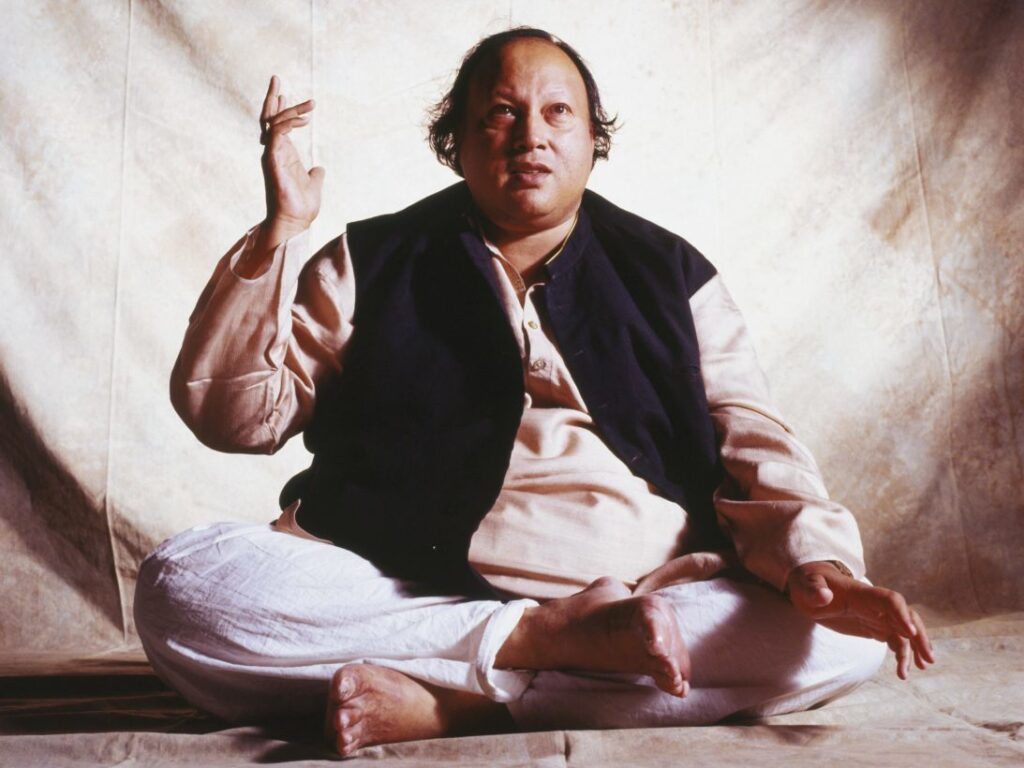
Popular culture
One of Khan’s famous qawwali songs, “Tere Bin Nahin Lagda” (“I am restless without you”), appeared on two of his 1996 albums, Sorrows Vol. 69 and Sangam (as “Tere Bin Nahin Lagda Dil”), the latter a collaborative album with Indian lyricist Javed Akhtar; Sangam sold over 1 million copies in India. Lata Mangeshkar recorded a cover version called “Tere Bin Nahin Jeena” for Kachche Dhaage, starring Ajay Devgn, Saif Ali Khan and Manisha Koirala. Composed by Nusrat Fateh Ali Khan, the Kachche Dhaage soundtrack album sold 3 million units in India. British-Indian producer Bally Sagoo remixed Tere Bin Nahin Lagda, and the track later appeared in the 2002 British film Bend It Like Beckham, starring Parminder Nagra and Keira Knightley. In 2018, Rahat Fateh Ali Khan and Asees Kaur recorded a cover version titled Tere Bin for the Bollywood film Simmba, featuring Ranveer Singh and Sara Ali Khan.
Nusrat Fateh Ali Khan’s music had a big impact on Bollywood music, inspiring numerous Indian musicians working in Bollywood since the late 1980s. For example, he inspired A. R. Rahman and Javed Akhtar, both of whom he collaborated with. However, there were many hit filmi songs from other Indian music directors that plagiarised Khan’s music. For example, Viju Shah’s hit song “Tu Cheez Badi Hai Mast Mast” in Mohra (1994) was plagiarised from Khan’s popular qawwali song “Dam Mast Qalandar.”
Despite the significant number of hit Bollywood songs plagiarised from his music, he was reportedly tolerant towards the plagiarism. In one interview, he jokingly gave “Best Copy” awards to Viju Shah and Anu Malik. In his defense, Malik claimed that he loved Khan’s music and was actually showing admiration by using his tunes. However, Khan was reportedly aggrieved when Malik turned his spiritual “Allah Hoo, Allah Hoo” into “I Love You, I Love You” in Auzaar. Khan said “he has taken my devotional song Allahu and converted it into I love you. He should at least respect my religious songs.”
His music also appears on soundtracks for Hollywood films such as The Last Temptation of Christ (1988), Natural Born Killers (1994), and Dead Man Walking (1995).
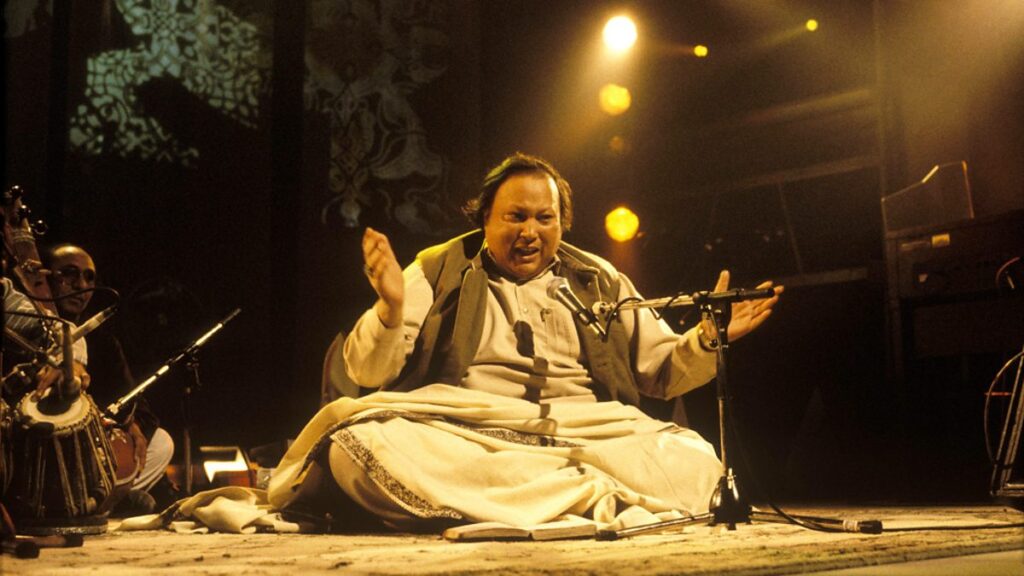
Discography
| Year | Title | Label |
|---|---|---|
| 1988 | In Concert in Paris, Vol 1 | Ocora |
| Shahen-Shah | Real World/CEMA | |
| 1990 | Mustt Mustt (Collaboration with Michael Brook) | Real World/CEMA |
| 1991 | Magic Touch | OSA |
| Shahbaaz | RealWorld/CEMA | |
| The Day, the Night, the Dawn, the Dusk | Shanachie Records | |
| 1992 | Devotional Songs | Real World |
| Love Songs | EMI | |
| Mighty Khan Vol 23 – Allah Hoo, Mast Nazron Se, Jana Jogi De Naal (collaboration with Andrew Kristy, Johnny Haynes) | OSA | |
| 1993 | Ilham | Audiorec |
| Traditional Sufi Qawwalis: Live in London, Vol. 2 | Navras Records | |
| 1994 | Pakistan: Vocal Art of the Sufis, Vol 2 – Qawwali | JVC |
| Nusrat Fateh Ali Khan & Party | Real World | |
| The Last Prophet | Real World | |
| Traditional Sufi Qawwalis: Live in London, Vol. 4 | Navras Records | |
| 1995 | Revelation | Interra/Intersound |
| Back to Qawwali | Long Distance | |
| 1996 | In Concert in Paris, Vol. 3–5 | Ocora |
| Qawwali: The Art of the Sufis | JVC | |
| Night Song | Real World | |
| Dead Man Walking: The Score | Columbia/Sony | |
| Intoxicated Spirit | Shanachie Records | |
| Mega Star | Interra | |
| Bandit Queen | Milan Records | |
| The Prophet Speaks | M.I.L. Multimedia | |
| Sangam | EMI | |
| 1997 | Live in India | RPG |
| Akhian | M.I.L. Multimedia | |
| Live in New York City | M.I.L. Multimedia | |
| Farewell Song: Alwadah | M.I.L. Multimedia. | |
| In Concert in Paris, Vol 2 | Ocora | |
| Oriente/Occidente: Gregorian Chant & Qawwali Music | Materiali Sonori | |
| 1998 | Allah & The Prophet | Ex Works |
| Star Rise: Remixes | EMI | |
| Live at Royal Albert Hall | M.I.L. Multimedia | |
| Missives from Allah | BCD | |
| Imprint: In Concert (Selections from the concert of 23 January 1993 at Meany Hall, University of Washington in Seattle, during Khan’s residency at their ethnomusicology program.) | Hi Horse Records | |
| 1999 | Peace | Omni Parc |
| Live at Islamabad, Vol 1–2 | M.I.L. Multimedia | |
| Passion | NYC Music | |
| Visions of Allah | Ex Works | |
| Swan Song | Narada Productions | |
| 2000 | Jewel | MoviePlay |
| Live in London, Vol 3 | Navras Records | |
| 2001 | Opus | Vanstory |
| The Final Studio Recordings | Legacy/Sony | |
| Pukaar: The Echo | Navras Records | |
| The Final Moment | Birdman Records | |
| 2002 | Body and Soul | Real World/CEMA |
| Sufi Qawwalis | Arc Music | |
| 2004 | Allah Hoo | Saregama |
| Aur Pyar Ho Gaya | Saregama. | |
| Ishq Da Rutba | Saregama | |
| Kartoos | Saregama | |
| Main Aur Meri Awargi | Saregama | |
| Ye Jo Halka | Saregama | |
| 2005 | Nami Danam | JVC |
| 2006 | Pukaar: The Echo | Navras Records |
| 2024 | Chain of Light | Real World |
Sales
Credited
| Year | Title | Sales | Ref | Region(s) |
|---|---|---|---|---|
| 1996 | Sangam | 1,000,000 | India | |
| 1997 | Only One | 6,000,000 | Worldwide | |
| Vande Mataram | 2,000,000 | |||
| Aur Pyaar Ho Gaya | 1,500,000 | India | ||
| “Afreen Afreen“ | 500,000 | |||
| 1999 | Kachche Dhaage | 3,000,000 | India | |
| 2000 | Dhadkan | 4,500,000 | ||
| 2007 | Guru | 1,150,000 | ||
| Total known sales | 19,650,000 | Worldwide |

